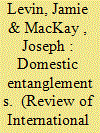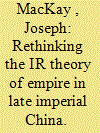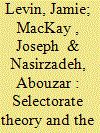|
|
|
Sort Order |
|
|
|
Items / Page
|
|
|
|
|
|
|
| Srl | Item |
| 1 |
ID:
164976


|
|
|
|
|
| Summary/Abstract |
This article revisits the Hobbesian account of the state of nature and the formation of states, attending to Hobbes’s account of the family. Drawing on feminist readings, we find in the Leviathan an account of the family as a natural political community. We contend specifically that a focus on conceptions of family life in the Leviathan, and in works by Hobbes’s early modern peers, points to the role of the family as a site of socialisation in the prelude to early state formation and in the formation of political hierarchies more generally – including, we suggest, the formation of international hierarchies. These accounts have thus far been missing from International Relations theory. Contra conventional IR theoretic readings of the Leviathan, the Hobbesian state of nature contains the seeds of both anarchy and hierarchy, as overlapping social configurations. While anarchy emerges clearly in the famous condition of ‘war of all against all’, hierarchy also exists in Hobbes’s depiction of family life as a naturally occurring proto-state setting. On the basis of this contemporary feminist analysis of a classic text, we consider implications for the emerging ‘new hierarchy studies’ in IR.
|
|
|
|
|
|
|
|
|
|
|
|
|
|
|
|
| 2 |
ID:
140026


|
|
|
|
|
| Summary/Abstract |
International relations scholars have recently taken increased interest in empire. However, research has often focused on European colonial empires. This article aims to evaluate imperialism in a non-Western historical setting: Late Imperial China. The article first compares extant international relations (IR) accounts of empire (one broad and one narrow) to theories of the East Asian hierarchical international system. Second, to further specify analysis, I evaluate IR theories of empire against the historical record of the Ming and Qing dynasties, addressing Chinese relations with surrounding ‘tributary’ states, conquered imperial possessions, and other neighboring polities. I argue that while IR theories of empire capture much of the region's historical politics, they nonetheless underspecify it. Theories of East Asian hierarchy suggest additional mechanisms at work. The historical cases suggest extensive variation in how empires expand and consolidate. I conclude that there is room for further theory building about empire in IR and suggest possible areas of emphasis.
|
|
|
|
|
|
|
|
|
|
|
|
|
|
|
|
| 3 |
ID:
143792


|
|
|
|
|
| Summary/Abstract |
UN peacekeeping has undergone two major shifts since the end of the cold war. The first is a move away from limited efforts to maintain peace in post-conflict environments towards more robust efforts at peace enforcement. Second, the composition of peacekeepers has changed. In 1990, the leading contributors of personnel to UN peacekeeping missions were notable supporters of multilateral cooperation and other liberal-democratic norms with extensive peacekeeping experience. As of 2012, however, the top contributors to UN peacekeeping missions had changed dramatically: Bangladesh, Pakistan, Ethiopia and Nigeria have replaced traditional peacekeepers Canada, Finland, Austria and Norway. While liberal-democratic nations continue to bear most of the costs, they have all but disappeared on the ground, leading to a precipitous decline in the quality of peacekeeping. The consequences of the latter shift are the subject of considerable debate. Some argue that peacekeeping facilitates the transmission of democratic norms and institutions to sending states. Others increasingly argue that the so-called ‘democratic peacekeeping’ hypothesis is a ‘myth’. We go further, suggesting that autocratic states may take on peacekeeping duties as a way of maintaining costly security apparatuses for the purposes of domestic repression. Peacekeeping – a feature of liberal post-cold war global governance – risks becoming a means to facilitate illiberal domestic governance in the developing world. We demonstrate this in two tentative but cautionary cases: Fiji and Bangladesh.
|
|
|
|
|
|
|
|
|
|
|
|
|
|
|
|
|
|
|
|
|